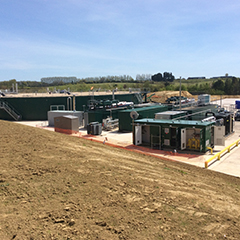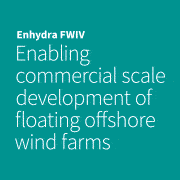£2.4m OptiNet project will investigate network optimisation solutions to decarbonise the gas network and support the transition to low carbon, smart energy systems.
Newbury, UK, 03 April 2019 – PassivSystems has won a contract to investigate optimisation solutions that will enable the wider connection of green gases into energy networks. Working with partners Wales & West Utilities, Cadent and Costain, PassivSystems will look at how smart pressure control, compression and storage solutions can alleviate network constraints as part of the £2.4m OptiNet project.
The use of green gas is forecast to grow as utilities aim to further decarbonise the UK’s energy networks. Currently, Wales & West Utilities supplies 130,000 homes with biomethane from 19 connected sites. Cadent’s forecasts suggest that the UK will have sufficient green gas to enable over 120 TWh to be injected into the gas network annually by 2035.
The growth of distributed gas generation, principally in the form of biomethane production, brings many challenges. Colin Calder, chief executive officer, PassivSystems, explained: “Balancing supply and demand on gas networks is becoming more complex with the rising number of distributed gas and biomethane connections.
“There are also new demand types to consider, like gas peaking plants, which ramp up quickly to deliver electricity during periods of peak demand and help balance generation from renewable energy. Increasing numbers of these plants are connecting into the gas distribution networks. Sudden changes in demand, as the peaking plant switch from online to offline, can cause pressure in the gas network to rise and fall unpredictably”.
Whole system solutions, which simultaneously optimise energy flows across gas and electricity networks, are essential to facilitate the delivery of sustainable energy solutions.
“To accommodate the breadth of change required to deliver a low carbon, smart energy system, we need to work with our partners to design and future-proof the UK gas network in harmony with the electricity network,” Calder added. “We need to balance an increase in green gas and distributed power generation and manage unprecedented pressures on the network. We have to develop and deploy an optimised network solution that can adapt to constant changes.”
The project will review a number of solutions to create capacity in the network to allow additional biomethane plants or other distributed gas generation to connect and flow, even in the lowest demand periods. This will maximise the opportunity to decarbonise the gas network and support the transition to a low carbon, smart energy system.
Chris Clarke, energy strategy director, Wales & West Utilities, said, “We’re looking forward to working with PassivSystems and the other gas networks to make sure that the injection of green gas is as efficient as possible. Enhancing the role of biomethane is an essential step on the path to delivering an affordable, reliable and green future for energy. Thanks to the iron mains replacement programme, which is upgrading old metal pipes to new plastic ones, the gas network is preparing for the future and ready for decarbonised gas.
As part of the OptiNet project, PassivSystems will look at how ‘plug and play’ compressor technology can be used across multiple sites without the need for bespoke modifications. The Honiton to Swindon medium pressure network has been selected as the demonstration network for this project. It was chosen as it is approaching a critical mass of biomethane enquiries in the area and a solution is required to enable a growth in capacity.
“We are delighted to bring our expertise in optimising energy flows across gas and electricity networks to help optimise networks for green gas. We’re proud that our work, including the recent Freedom project that we worked on in partnership with Wales & West Utilities, proved the effectiveness of hybrid heating as a strategy for decarbonising domestic heat, is actively helping to shape government policy,” concluded Calder.
About PassivSystems
PassivSystems, an award-winning company, has developed a secure, scalable cloud-based ‘PassivEnergy’ smart home energy management platform for collecting and optimising data collected from smart meters, solar PV systems, batteries and all types of residential heating systems, including district heating. Its smart heating service has been demonstrated to significantly reduce lifetime operating costs to UK households worth hundreds of pounds a year per household. PassivSystems is the leading provider of domestic solar PV asset management services and its technology has been selected by leading utilities to differentiate their supply services.
The intermittent nature of renewable sources like wind and solar is challenging grid operators to maintain stable electricity networks that can manage both highly variable sources of supply and demand. PassivSystems’ vision is that every household can benefit from cheaper, cleaner energy by playing their part in balancing the grid. By developing and operating smart data services that manage equipment in homes, PassivSystems’ mission is to create sustainable value from energy systems.
The company was founded in 2008. It employs 50 people and operates through its headquarters in Newbury. For more information, visit www.passivsystems.com





























